Organizational Behaviour: Groups, Teamwork, Technology in John Lewis
VerifiedAdded on 2023/04/22
|10
|1133
|438
Report
AI Summary
This report delves into organizational behaviour, exploring the nature of groups and teams, including formal and informal group types. It examines the process of team member selection, incorporating insights from Belbin's theory on team roles and Tuckman's stages of team development. The report also analyzes factors promoting effective teamwork, such as collaborative decision-making, diversity, and cohesiveness, while also addressing dysfunctional team dynamics. Furthermore, it investigates the impact of technology, specifically Wi-Fi and various communication tools, on team functioning within the context of the John Lewis Partnership, highlighting how technology enhances services and customer engagement. The report concludes with a list of relevant references to support the findings.
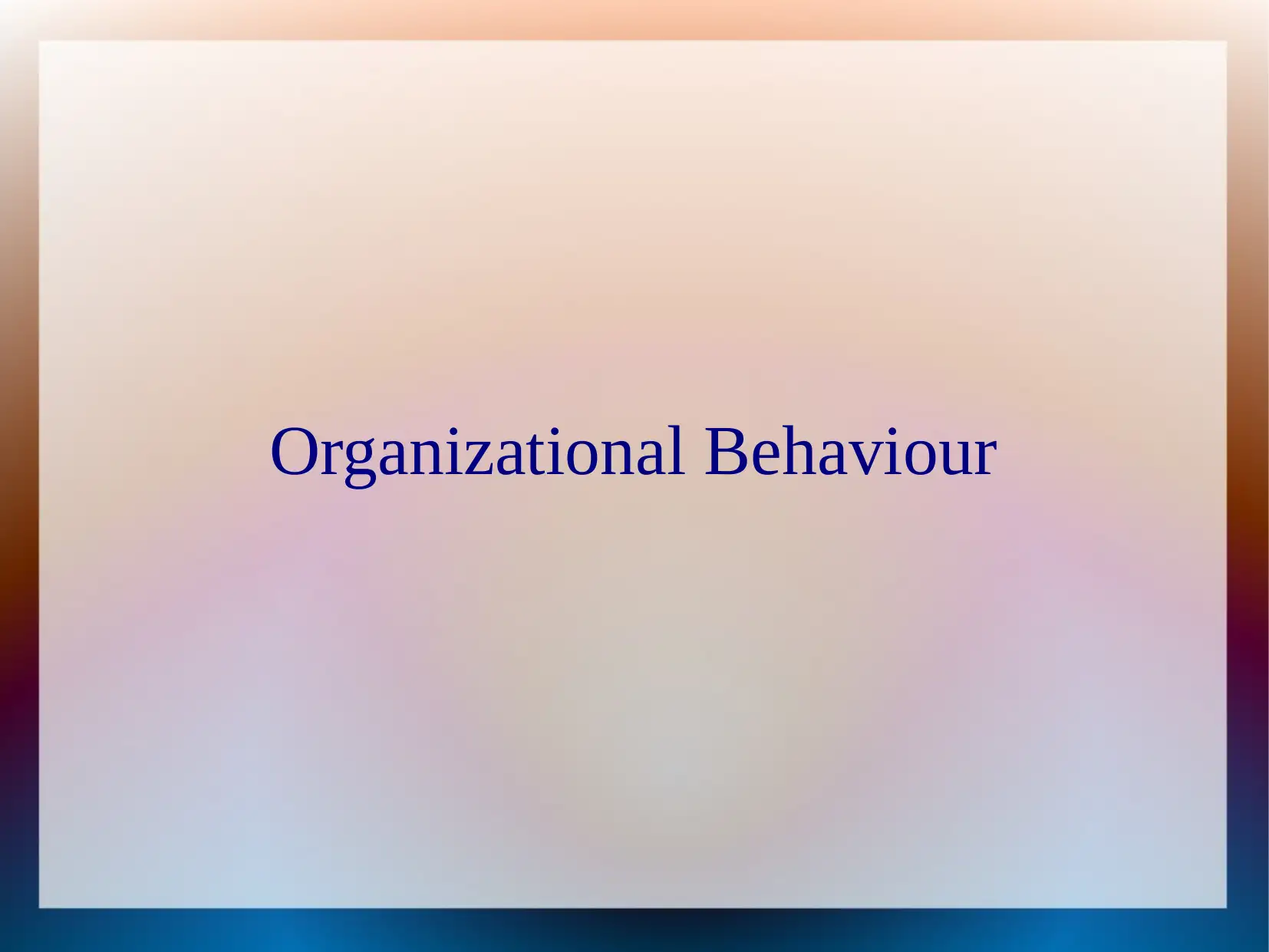
Organizational Behaviour
Paraphrase This Document
Need a fresh take? Get an instant paraphrase of this document with our AI Paraphraser
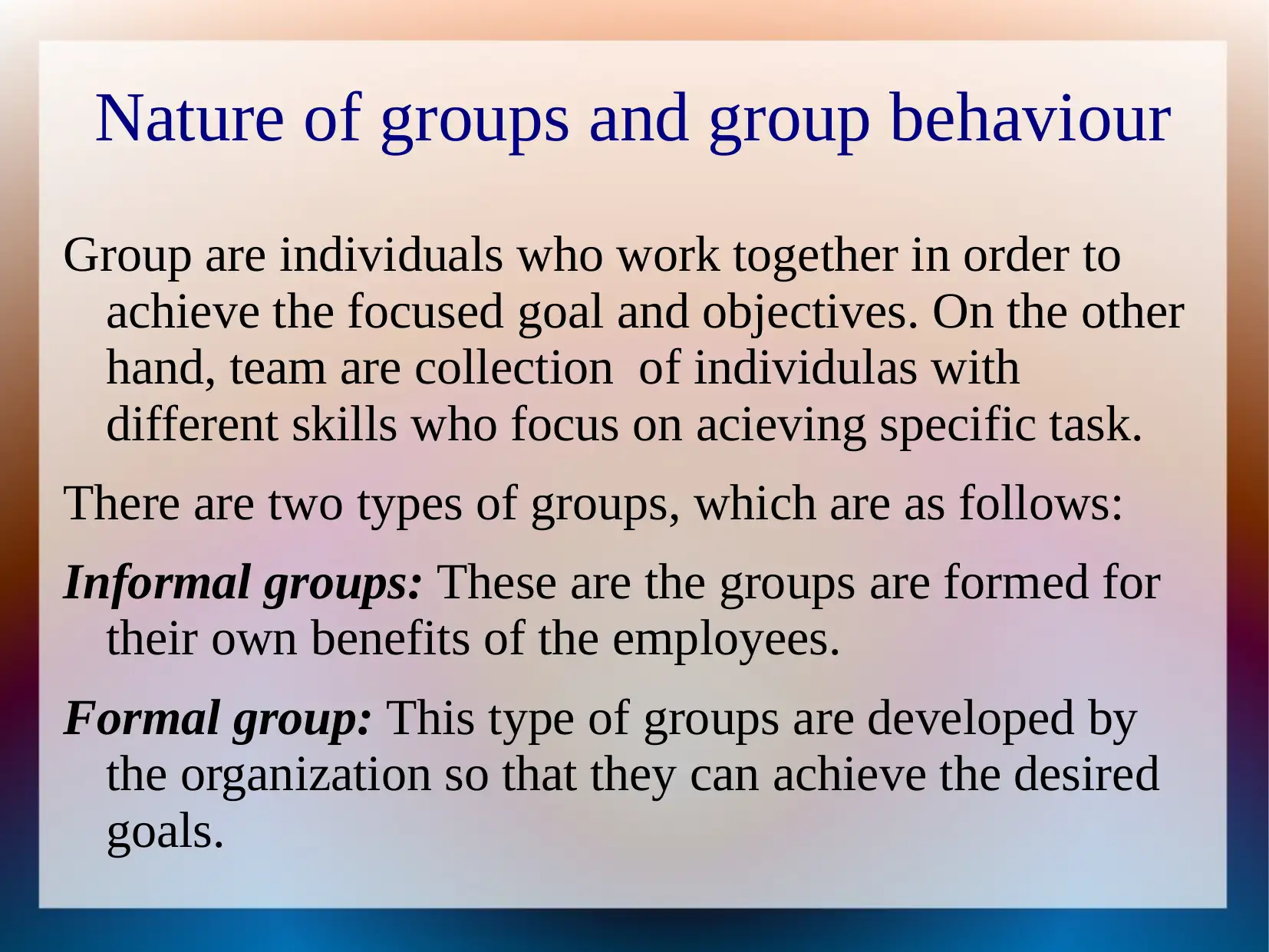
Nature of groups and group behaviour
Group are individuals who work together in order to
achieve the focused goal and objectives. On the other
hand, team are collection of individulas with
different skills who focus on acieving specific task.
There are two types of groups, which are as follows:
Informal groups: These are the groups are formed for
their own benefits of the employees.
Formal group: This type of groups are developed by
the organization so that they can achieve the desired
goals.
Group are individuals who work together in order to
achieve the focused goal and objectives. On the other
hand, team are collection of individulas with
different skills who focus on acieving specific task.
There are two types of groups, which are as follows:
Informal groups: These are the groups are formed for
their own benefits of the employees.
Formal group: This type of groups are developed by
the organization so that they can achieve the desired
goals.
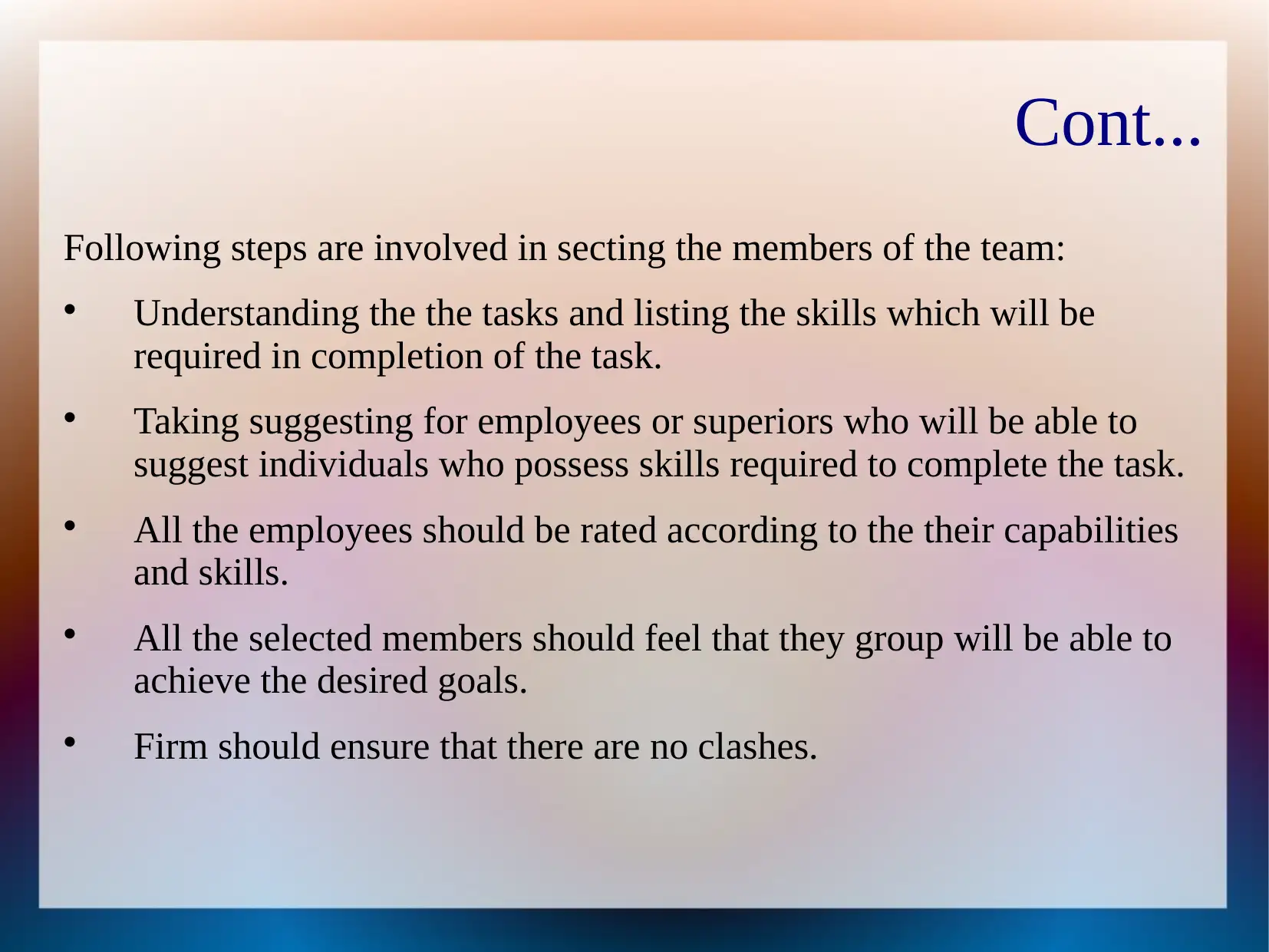
Cont...
Following steps are involved in secting the members of the team:
Understanding the the tasks and listing the skills which will be
required in completion of the task.
Taking suggesting for employees or superiors who will be able to
suggest individuals who possess skills required to complete the task.
All the employees should be rated according to the their capabilities
and skills.
All the selected members should feel that they group will be able to
achieve the desired goals.
Firm should ensure that there are no clashes.
Following steps are involved in secting the members of the team:
Understanding the the tasks and listing the skills which will be
required in completion of the task.
Taking suggesting for employees or superiors who will be able to
suggest individuals who possess skills required to complete the task.
All the employees should be rated according to the their capabilities
and skills.
All the selected members should feel that they group will be able to
achieve the desired goals.
Firm should ensure that there are no clashes.
⊘ This is a preview!⊘
Do you want full access?
Subscribe today to unlock all pages.

Trusted by 1+ million students worldwide
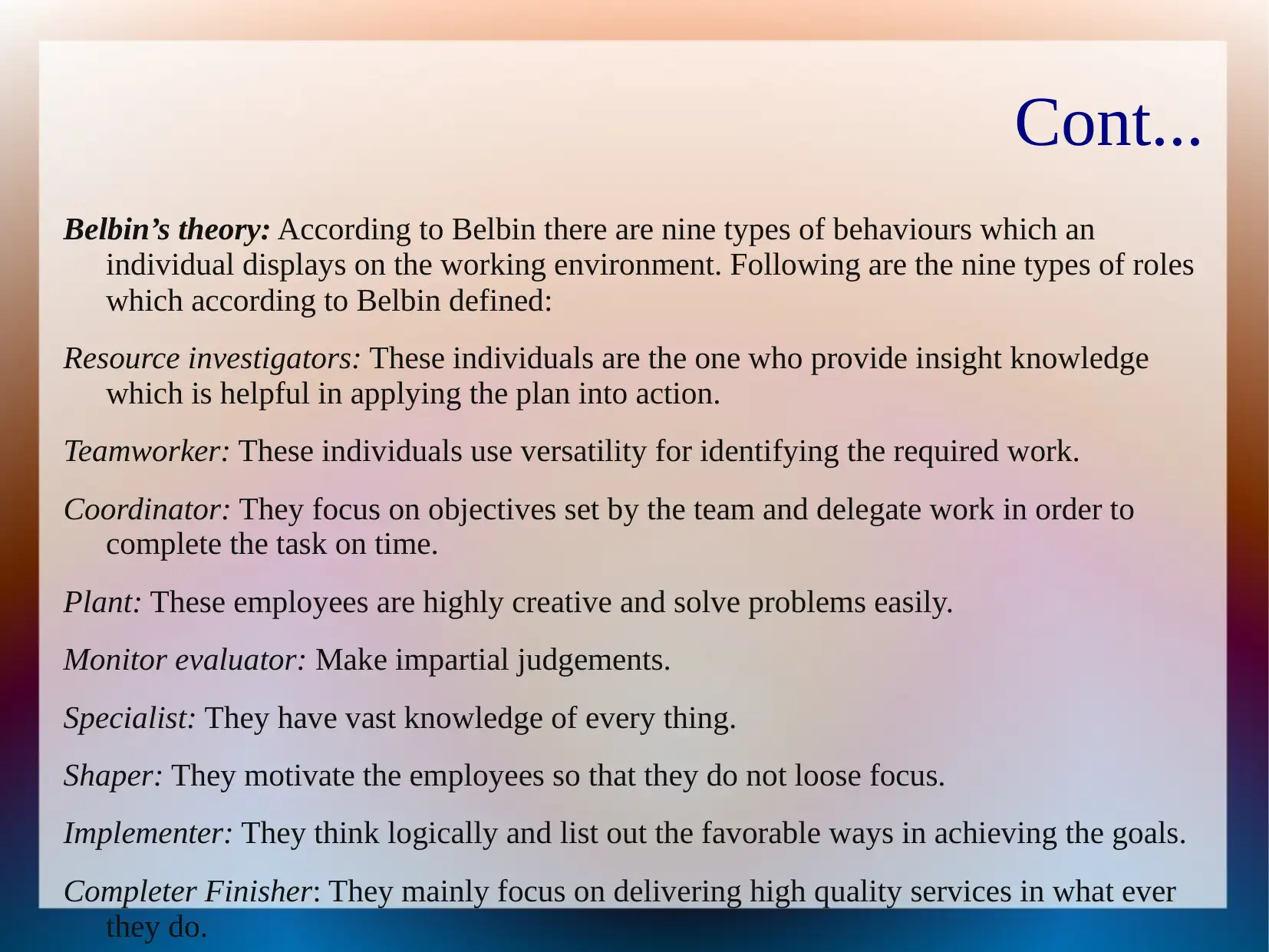
Cont...
Belbin’s theory: According to Belbin there are nine types of behaviours which an
individual displays on the working environment. Following are the nine types of roles
which according to Belbin defined:
Resource investigators: These individuals are the one who provide insight knowledge
which is helpful in applying the plan into action.
Teamworker: These individuals use versatility for identifying the required work.
Coordinator: They focus on objectives set by the team and delegate work in order to
complete the task on time.
Plant: These employees are highly creative and solve problems easily.
Monitor evaluator: Make impartial judgements.
Specialist: They have vast knowledge of every thing.
Shaper: They motivate the employees so that they do not loose focus.
Implementer: They think logically and list out the favorable ways in achieving the goals.
Completer Finisher: They mainly focus on delivering high quality services in what ever
they do.
Belbin’s theory: According to Belbin there are nine types of behaviours which an
individual displays on the working environment. Following are the nine types of roles
which according to Belbin defined:
Resource investigators: These individuals are the one who provide insight knowledge
which is helpful in applying the plan into action.
Teamworker: These individuals use versatility for identifying the required work.
Coordinator: They focus on objectives set by the team and delegate work in order to
complete the task on time.
Plant: These employees are highly creative and solve problems easily.
Monitor evaluator: Make impartial judgements.
Specialist: They have vast knowledge of every thing.
Shaper: They motivate the employees so that they do not loose focus.
Implementer: They think logically and list out the favorable ways in achieving the goals.
Completer Finisher: They mainly focus on delivering high quality services in what ever
they do.
Paraphrase This Document
Need a fresh take? Get an instant paraphrase of this document with our AI Paraphraser
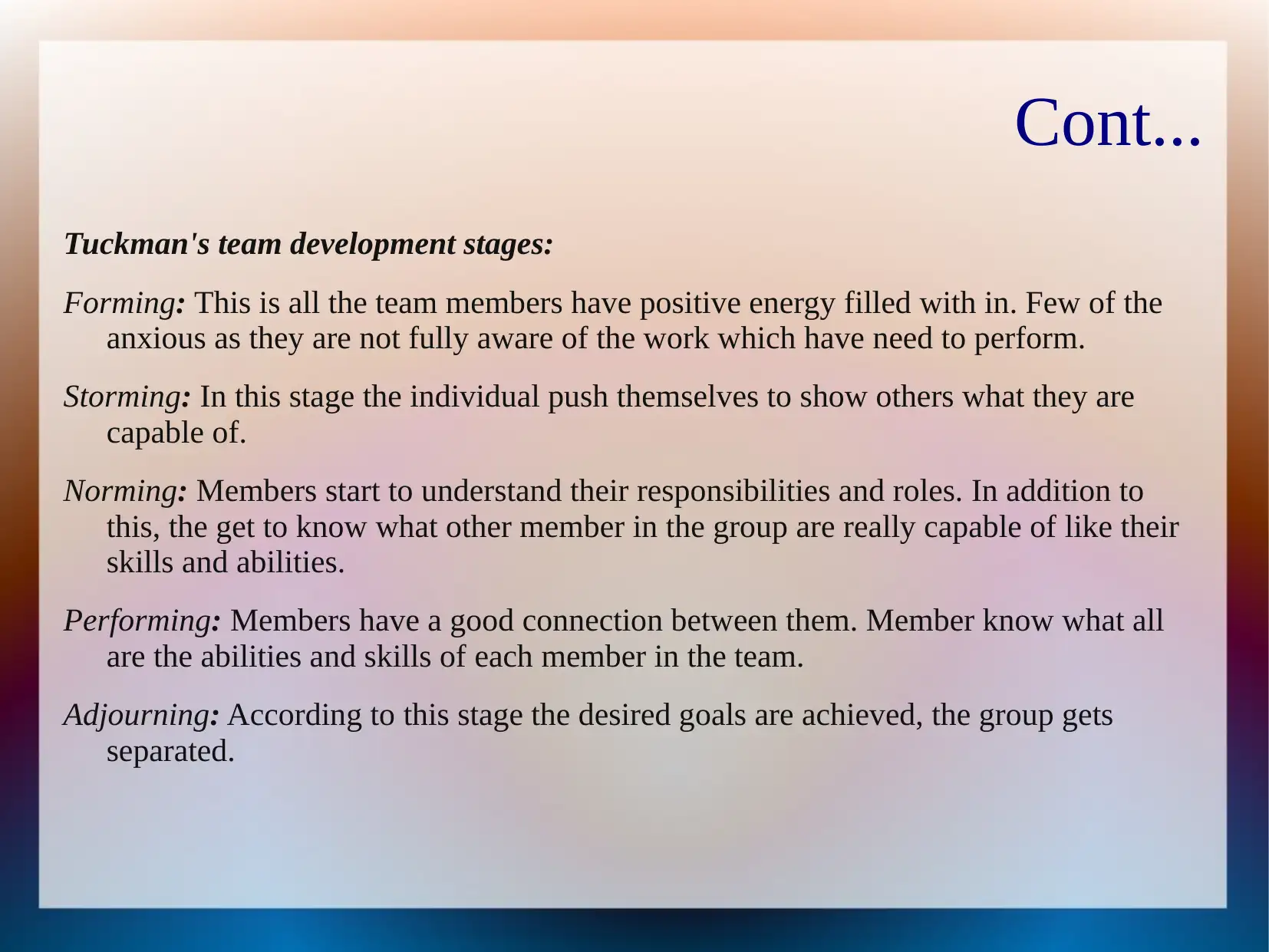
Cont...
Tuckman's team development stages:
Forming: This is all the team members have positive energy filled with in. Few of the
anxious as they are not fully aware of the work which have need to perform.
Storming: In this stage the individual push themselves to show others what they are
capable of.
Norming: Members start to understand their responsibilities and roles. In addition to
this, the get to know what other member in the group are really capable of like their
skills and abilities.
Performing: Members have a good connection between them. Member know what all
are the abilities and skills of each member in the team.
Adjourning: According to this stage the desired goals are achieved, the group gets
separated.
Tuckman's team development stages:
Forming: This is all the team members have positive energy filled with in. Few of the
anxious as they are not fully aware of the work which have need to perform.
Storming: In this stage the individual push themselves to show others what they are
capable of.
Norming: Members start to understand their responsibilities and roles. In addition to
this, the get to know what other member in the group are really capable of like their
skills and abilities.
Performing: Members have a good connection between them. Member know what all
are the abilities and skills of each member in the team.
Adjourning: According to this stage the desired goals are achieved, the group gets
separated.
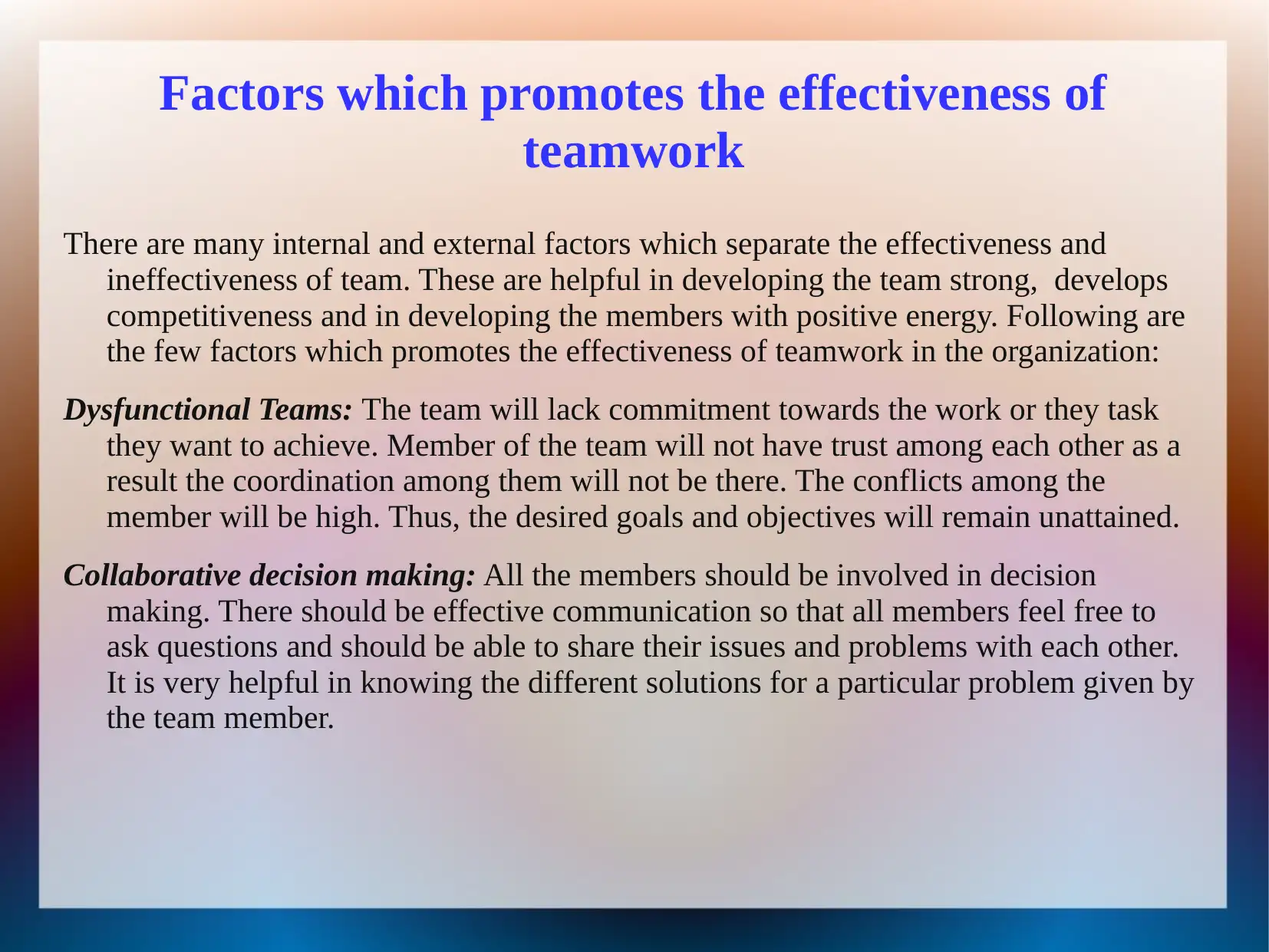
Factors which promotes the effectiveness of
teamwork
There are many internal and external factors which separate the effectiveness and
ineffectiveness of team. These are helpful in developing the team strong, develops
competitiveness and in developing the members with positive energy. Following are
the few factors which promotes the effectiveness of teamwork in the organization:
Dysfunctional Teams: The team will lack commitment towards the work or they task
they want to achieve. Member of the team will not have trust among each other as a
result the coordination among them will not be there. The conflicts among the
member will be high. Thus, the desired goals and objectives will remain unattained.
Collaborative decision making: All the members should be involved in decision
making. There should be effective communication so that all members feel free to
ask questions and should be able to share their issues and problems with each other.
It is very helpful in knowing the different solutions for a particular problem given by
the team member.
teamwork
There are many internal and external factors which separate the effectiveness and
ineffectiveness of team. These are helpful in developing the team strong, develops
competitiveness and in developing the members with positive energy. Following are
the few factors which promotes the effectiveness of teamwork in the organization:
Dysfunctional Teams: The team will lack commitment towards the work or they task
they want to achieve. Member of the team will not have trust among each other as a
result the coordination among them will not be there. The conflicts among the
member will be high. Thus, the desired goals and objectives will remain unattained.
Collaborative decision making: All the members should be involved in decision
making. There should be effective communication so that all members feel free to
ask questions and should be able to share their issues and problems with each other.
It is very helpful in knowing the different solutions for a particular problem given by
the team member.
⊘ This is a preview!⊘
Do you want full access?
Subscribe today to unlock all pages.

Trusted by 1+ million students worldwide
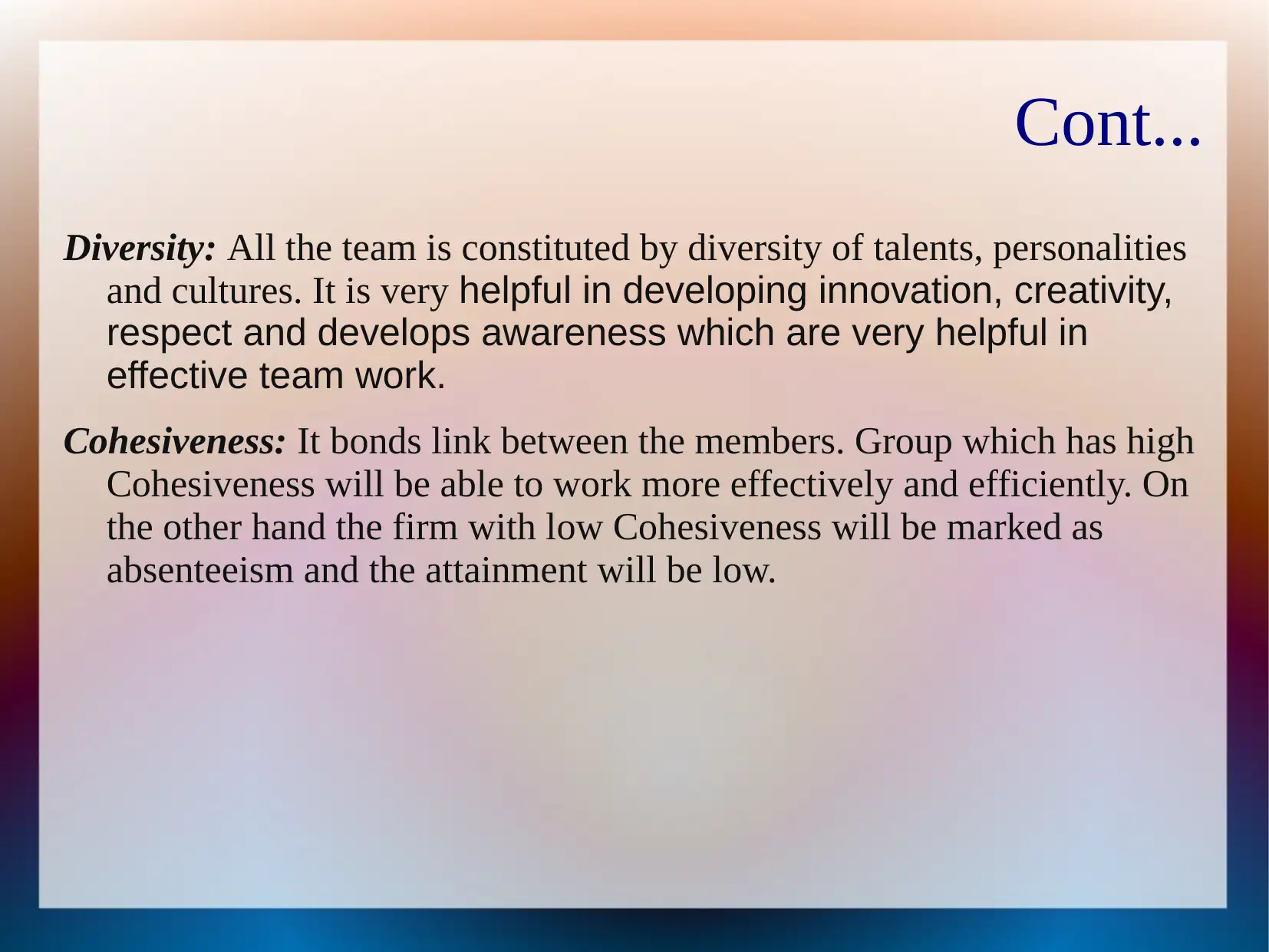
Cont...
Diversity: All the team is constituted by diversity of talents, personalities
and cultures. It is very helpful in developing innovation, creativity,
respect and develops awareness which are very helpful in
effective team work.
Cohesiveness: It bonds link between the members. Group which has high
Cohesiveness will be able to work more effectively and efficiently. On
the other hand the firm with low Cohesiveness will be marked as
absenteeism and the attainment will be low.
Diversity: All the team is constituted by diversity of talents, personalities
and cultures. It is very helpful in developing innovation, creativity,
respect and develops awareness which are very helpful in
effective team work.
Cohesiveness: It bonds link between the members. Group which has high
Cohesiveness will be able to work more effectively and efficiently. On
the other hand the firm with low Cohesiveness will be marked as
absenteeism and the attainment will be low.
Paraphrase This Document
Need a fresh take? Get an instant paraphrase of this document with our AI Paraphraser
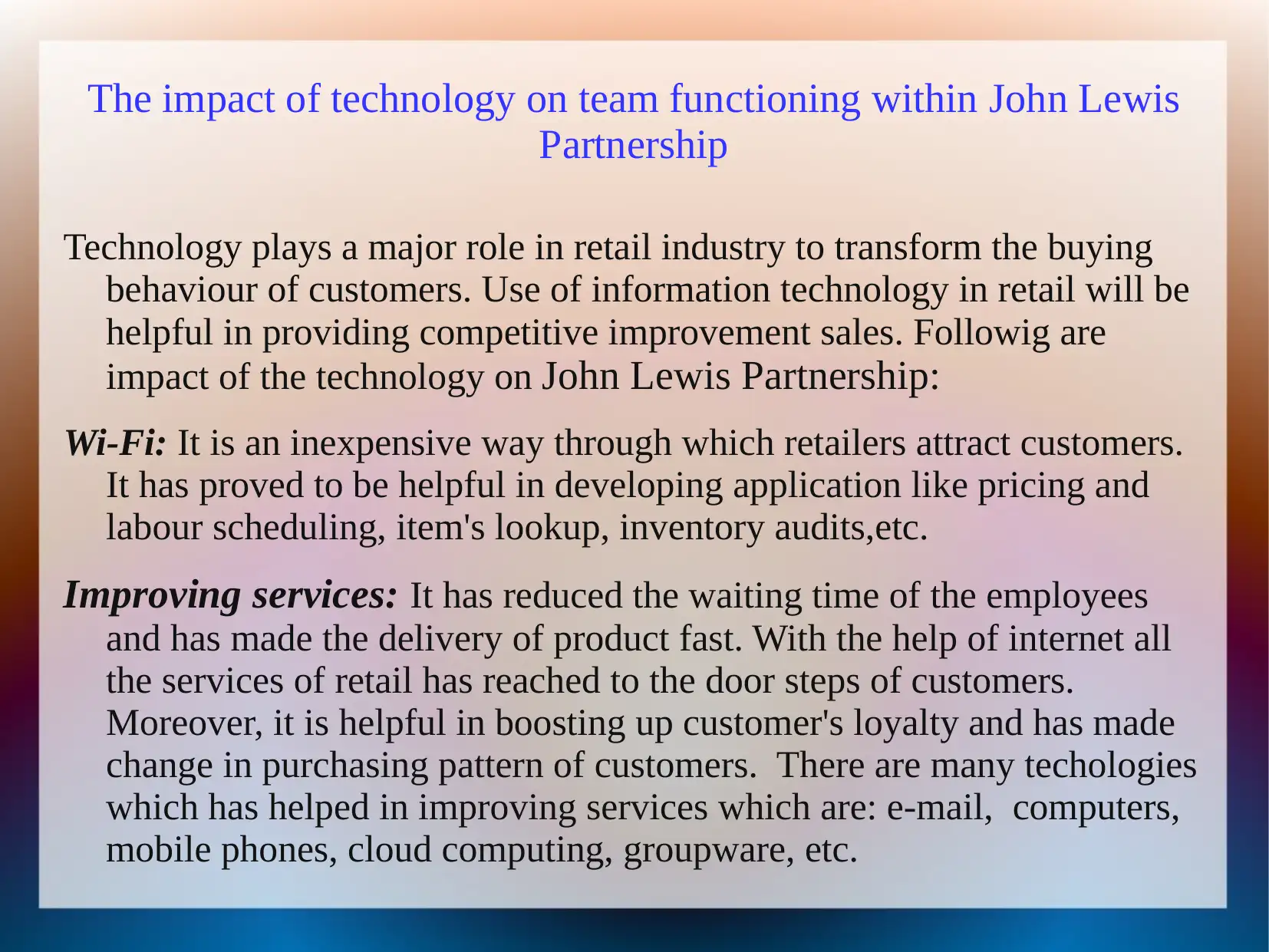
The impact of technology on team functioning within John Lewis
Partnership
Technology plays a major role in retail industry to transform the buying
behaviour of customers. Use of information technology in retail will be
helpful in providing competitive improvement sales. Followig are
impact of the technology on John Lewis Partnership:
Wi-Fi: It is an inexpensive way through which retailers attract customers.
It has proved to be helpful in developing application like pricing and
labour scheduling, item's lookup, inventory audits,etc.
Improving services: It has reduced the waiting time of the employees
and has made the delivery of product fast. With the help of internet all
the services of retail has reached to the door steps of customers.
Moreover, it is helpful in boosting up customer's loyalty and has made
change in purchasing pattern of customers. There are many techologies
which has helped in improving services which are: e-mail, computers,
mobile phones, cloud computing, groupware, etc.
Partnership
Technology plays a major role in retail industry to transform the buying
behaviour of customers. Use of information technology in retail will be
helpful in providing competitive improvement sales. Followig are
impact of the technology on John Lewis Partnership:
Wi-Fi: It is an inexpensive way through which retailers attract customers.
It has proved to be helpful in developing application like pricing and
labour scheduling, item's lookup, inventory audits,etc.
Improving services: It has reduced the waiting time of the employees
and has made the delivery of product fast. With the help of internet all
the services of retail has reached to the door steps of customers.
Moreover, it is helpful in boosting up customer's loyalty and has made
change in purchasing pattern of customers. There are many techologies
which has helped in improving services which are: e-mail, computers,
mobile phones, cloud computing, groupware, etc.
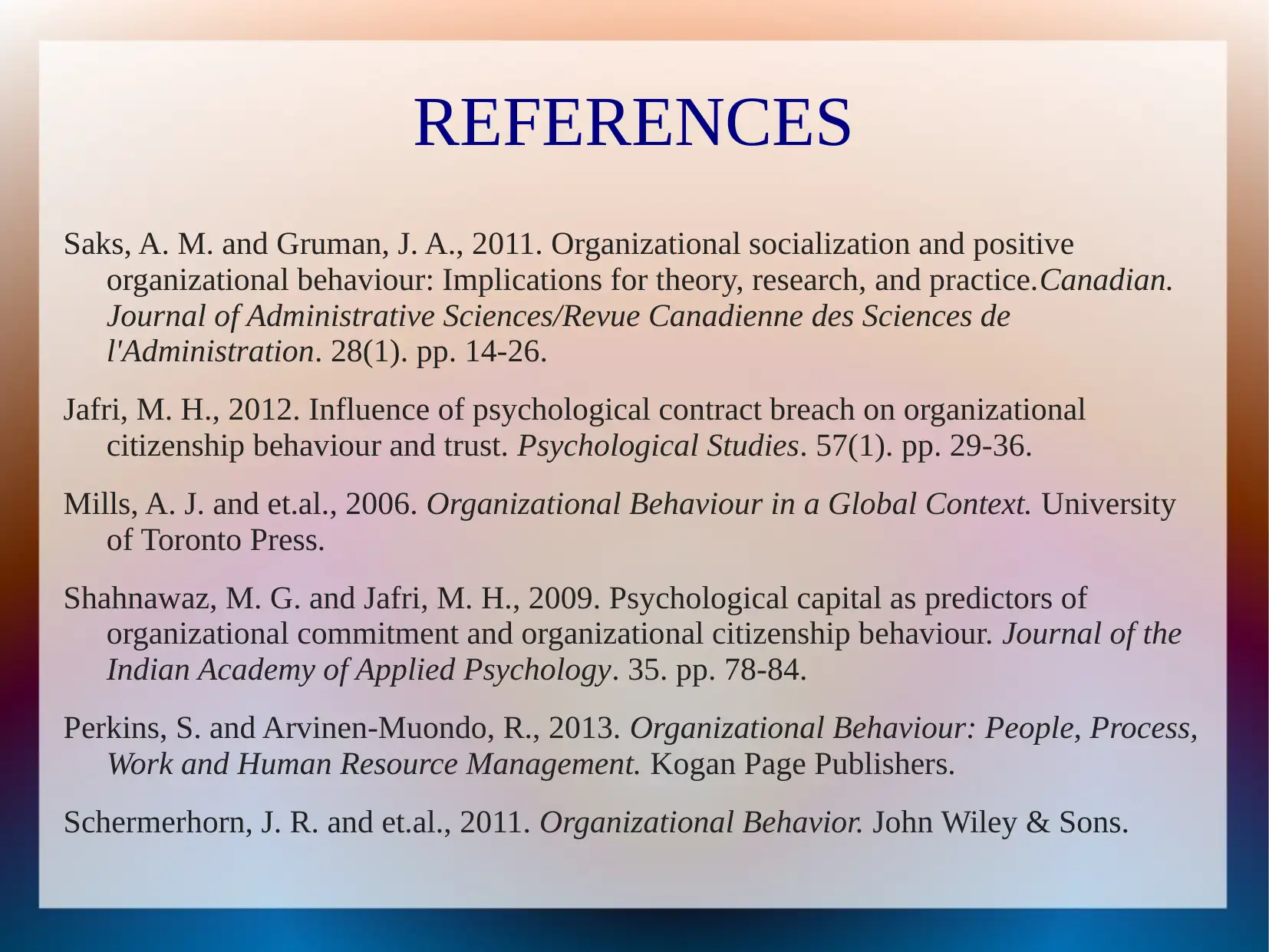
REFERENCES
Saks, A. M. and Gruman, J. A., 2011. Organizational socialization and positive
organizational behaviour: Implications for theory, research, and practice.Canadian.
Journal of Administrative Sciences/Revue Canadienne des Sciences de
l'Administration. 28(1). pp. 14-26.
Jafri, M. H., 2012. Influence of psychological contract breach on organizational
citizenship behaviour and trust. Psychological Studies. 57(1). pp. 29-36.
Mills, A. J. and et.al., 2006. Organizational Behaviour in a Global Context. University
of Toronto Press.
Shahnawaz, M. G. and Jafri, M. H., 2009. Psychological capital as predictors of
organizational commitment and organizational citizenship behaviour. Journal of the
Indian Academy of Applied Psychology. 35. pp. 78-84.
Perkins, S. and Arvinen-Muondo, R., 2013. Organizational Behaviour: People, Process,
Work and Human Resource Management. Kogan Page Publishers.
Schermerhorn, J. R. and et.al., 2011. Organizational Behavior. John Wiley & Sons.
Saks, A. M. and Gruman, J. A., 2011. Organizational socialization and positive
organizational behaviour: Implications for theory, research, and practice.Canadian.
Journal of Administrative Sciences/Revue Canadienne des Sciences de
l'Administration. 28(1). pp. 14-26.
Jafri, M. H., 2012. Influence of psychological contract breach on organizational
citizenship behaviour and trust. Psychological Studies. 57(1). pp. 29-36.
Mills, A. J. and et.al., 2006. Organizational Behaviour in a Global Context. University
of Toronto Press.
Shahnawaz, M. G. and Jafri, M. H., 2009. Psychological capital as predictors of
organizational commitment and organizational citizenship behaviour. Journal of the
Indian Academy of Applied Psychology. 35. pp. 78-84.
Perkins, S. and Arvinen-Muondo, R., 2013. Organizational Behaviour: People, Process,
Work and Human Resource Management. Kogan Page Publishers.
Schermerhorn, J. R. and et.al., 2011. Organizational Behavior. John Wiley & Sons.
⊘ This is a preview!⊘
Do you want full access?
Subscribe today to unlock all pages.

Trusted by 1+ million students worldwide
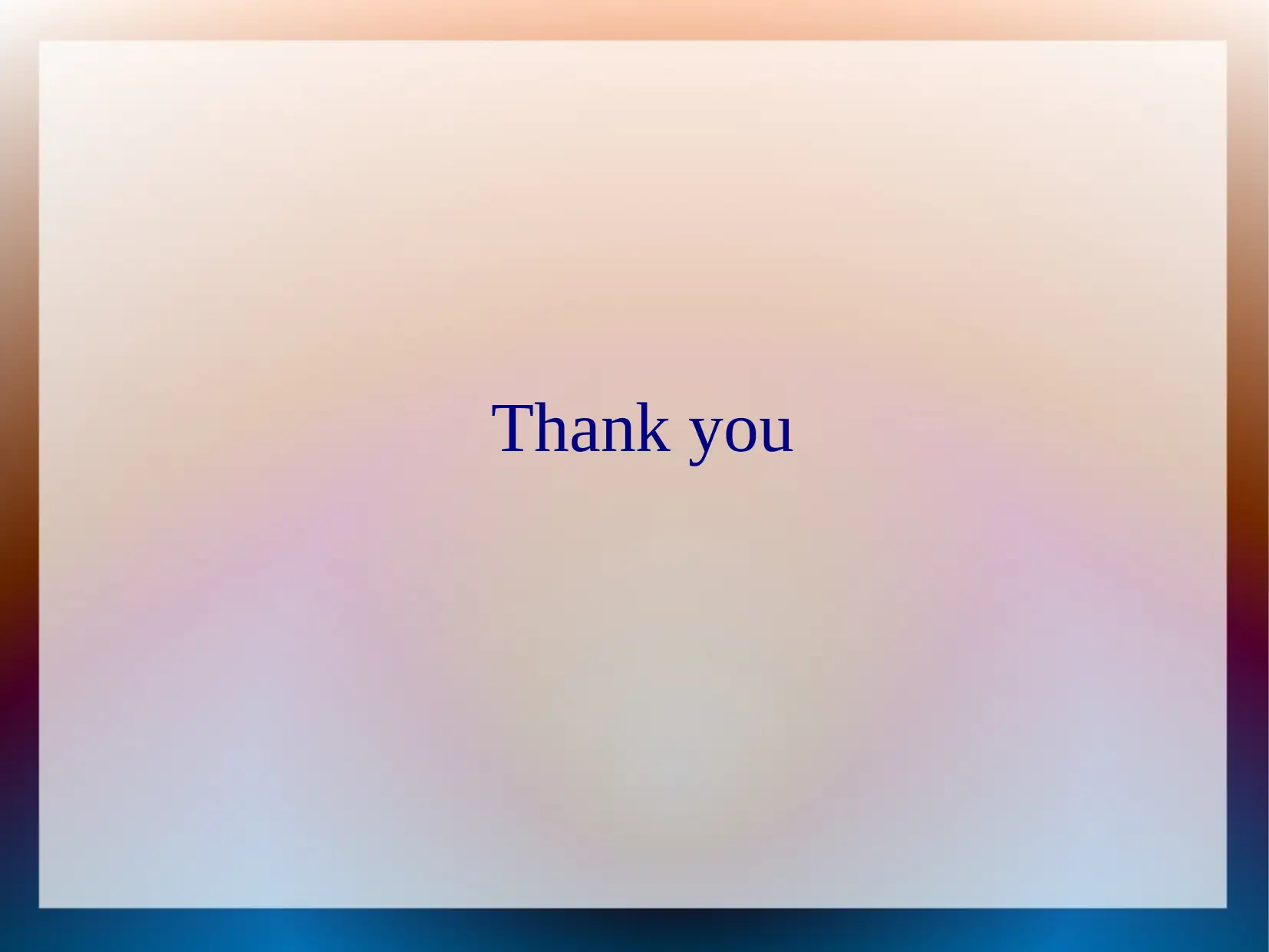
Thank you
1 out of 10
Related Documents
Your All-in-One AI-Powered Toolkit for Academic Success.
+13062052269
info@desklib.com
Available 24*7 on WhatsApp / Email
![[object Object]](/_next/static/media/star-bottom.7253800d.svg)
Unlock your academic potential
Copyright © 2020–2026 A2Z Services. All Rights Reserved. Developed and managed by ZUCOL.





